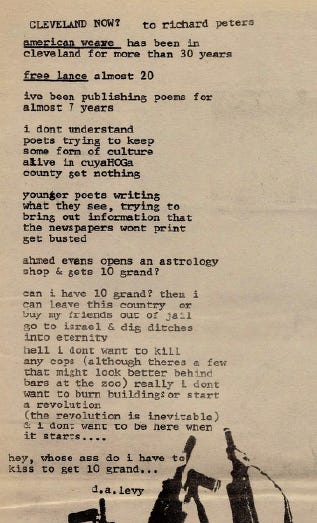Last night, I got to thinking about d a levy, and that took me to the fine people at the Cleveland Memory Project, who have digitized many of levy’s mimeographed ‘zines. Up on my MacBook Air screen I stared at levy’s anguished faded typewritten rage at the city of Cleveland with a familiarity I had not anticipated.
To be a bit too cute, consider recent changes in arts funding while reading this poem from a 1968 issue of The Buddhist Third Class Junkmail Oracle
“I dont understand
poets trying to keep
some form of culture
alive in cuyaHOGa
county get nothing…
hey, whose ass do I have to
kiss to get 10 grand….”

Or think about the problem of Clevelander’s self-censorship when reading this poem from another issue of Junkmail Oracle:
“I can’t get anyone to write a damn thing about the city.”

Or even the idea of coterie writing, which was perhaps levy’s most significant achievement: ‘zines, blogs, tumblrs, and… substacks (?) are all heirs of his mimeographed publications, which he sold for ten cents per issue to Clevelanders, fifteen cents to out-of-towners, and free to the indigent.
But enough self-indulgence and projection. I was stung last week by a FB comment that this Chronicle was just a ‘litany of complaints’ and if it is such torture for me I should just ‘leave the city.” That, by the way, is exactly what levy was constantly stating he was going to do: ‘leave the city’. He would talk about moving to Milwaukee, or New Orleans, or New York—someplace where the city better appreciated its poets. But ‘leave the city' was also a euphemism. levy used it to discuss what he was planning to do in the weeks that lead to his death. He told friends he was preparing to ‘leave the city’ and would they take over the Oracle for him, get his mail at the bookstore he used as a permanent address. And leave the city is what they thought he had done until they discovered his body in his apartment, a self-inflicted bullet hole through the head.
I have no interest in romanticizing levy: reading his poetry, and particularly reading Oracle, I physically recoiled at the misogyny, the stench of which suffuses all the PDFs. And while he did type some great lines, let’s be honest: he was only ever a very young man, besotted by himself. Still, he did start a small press in Cleveland, created a short-lived but intense community, able to rally people around him, and, though it perhaps literally killed him, he brought national attention to the overstepping police, who arrested him on trumped up charges.

When levy decided to end the Oracle, he wrote this middle finger good bye note:
“The spiritual corpse of the “hip community” can continue to learn where its at from Life Magazine & the Cleveland Plain Dealer as they have in the past.”

Endearingly, this was not the final issue: the magazine kept publishing, and there are five last issues, labelled “fourth last issue,” “second last issue,” etc.
Not enough has been written about levy, but luckily Erick Trickey (one of the city’s best cultural journalists, so sad he’s moved away) wrote a deep dive a few years ago for Cleveland Magazine; it’s a fine thing to spend some time reading on this sunny first day of March.
The city has been home to a few great poets: Hart Crane, who had perhaps an even more tortured relationship to the city than levy; Langston Hughes, who many consider a Clevelander but I do not, as he only lived here for a few years in his teens; Russell Atkins, a contemporary of levy’s, whose reputation is growing, unlike the other two, whose stock has long been falling on the literary market. And, of course, the shocking revelation from earlier this year that one of the nation’s most revered poets was from here all along.
All my thanks and appreciation to the folks at CSU who preserved and digitized these publications, allowing anyone, including one woman with insomnia on the last day of February, to read ephemera in the future. Here is a list of all the individuals who made it happen.

